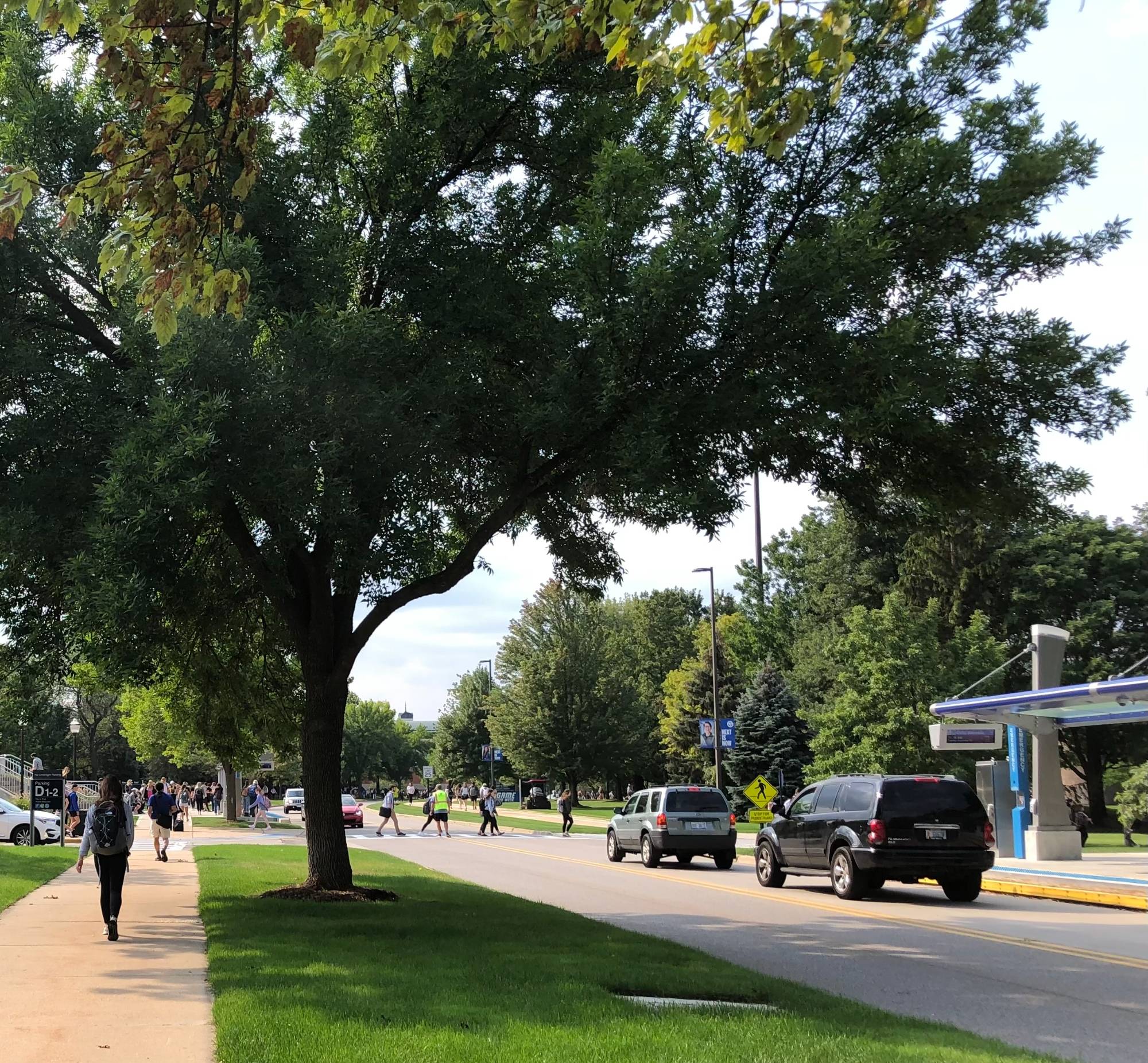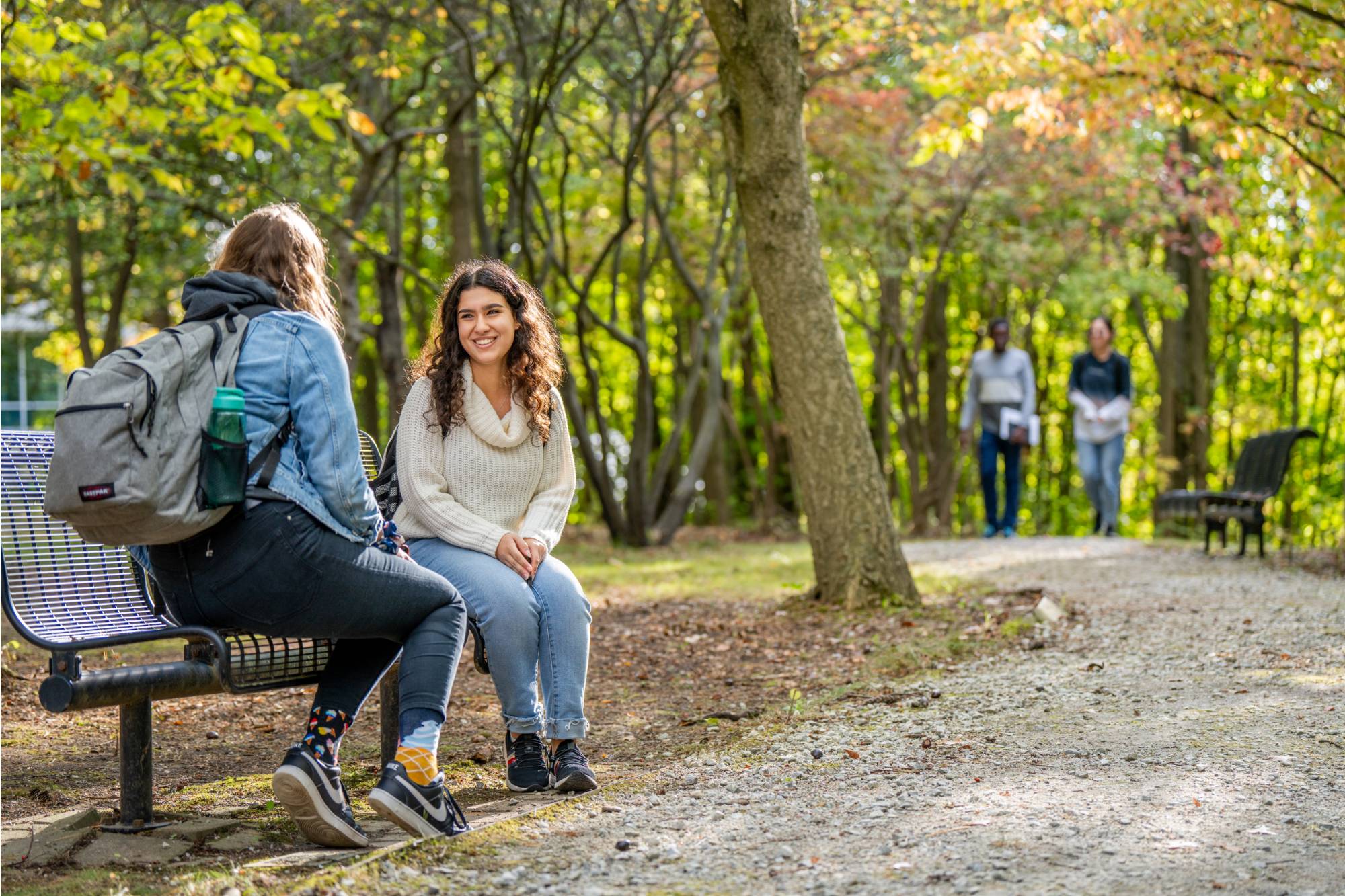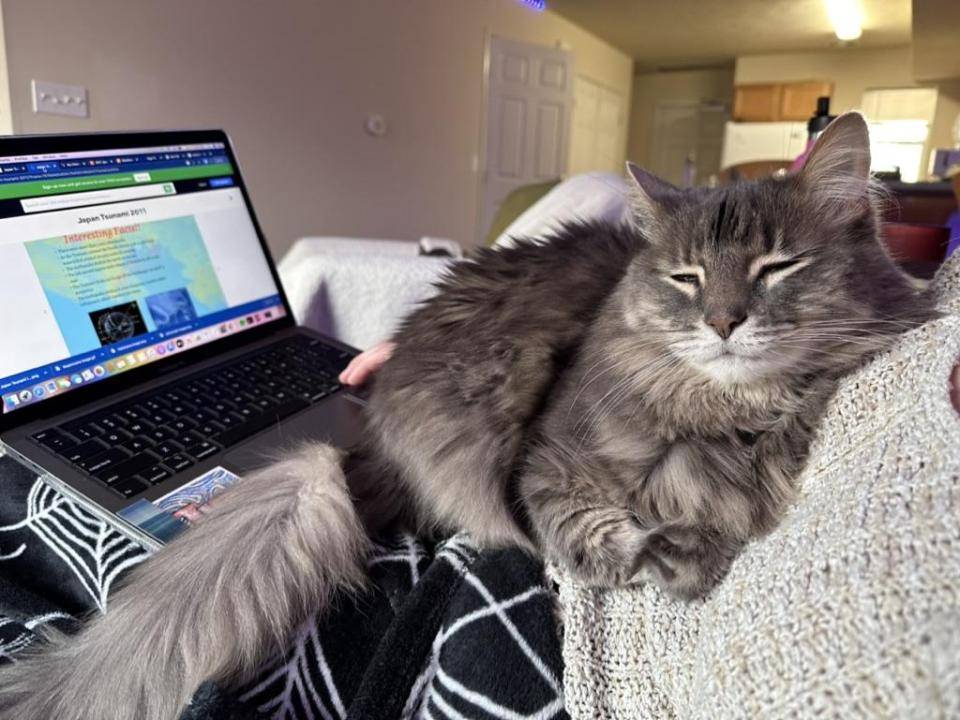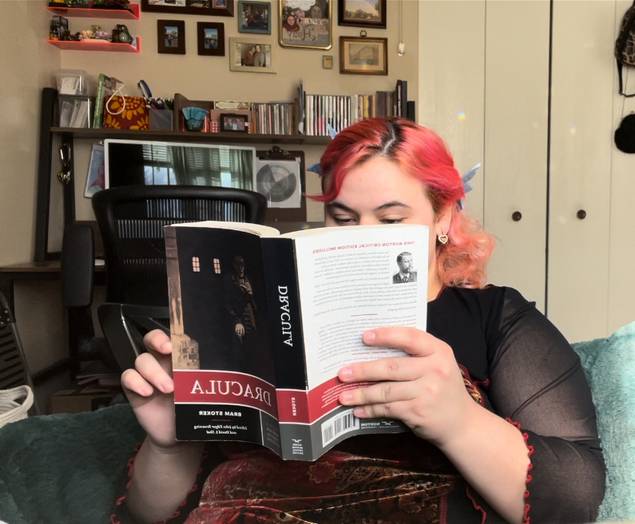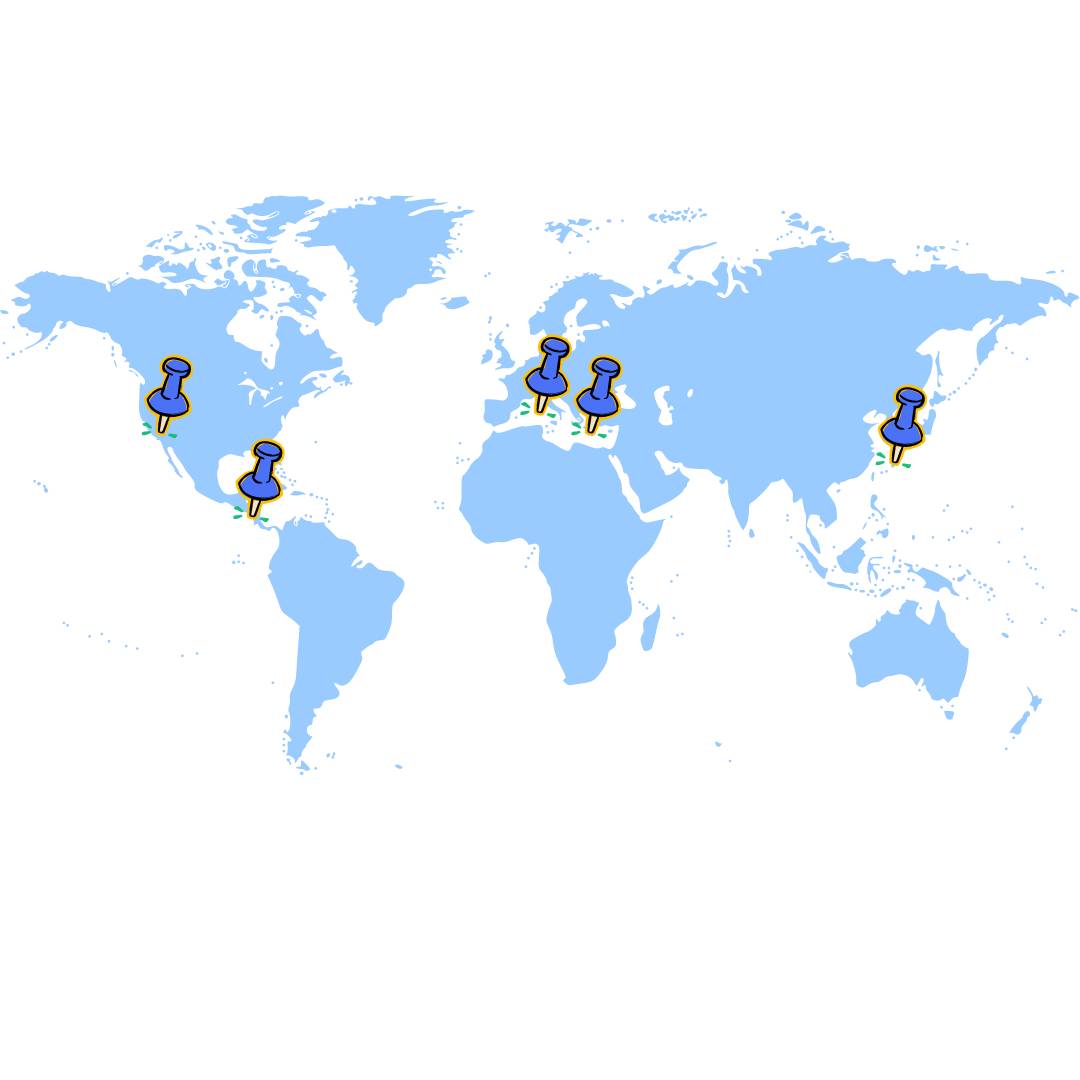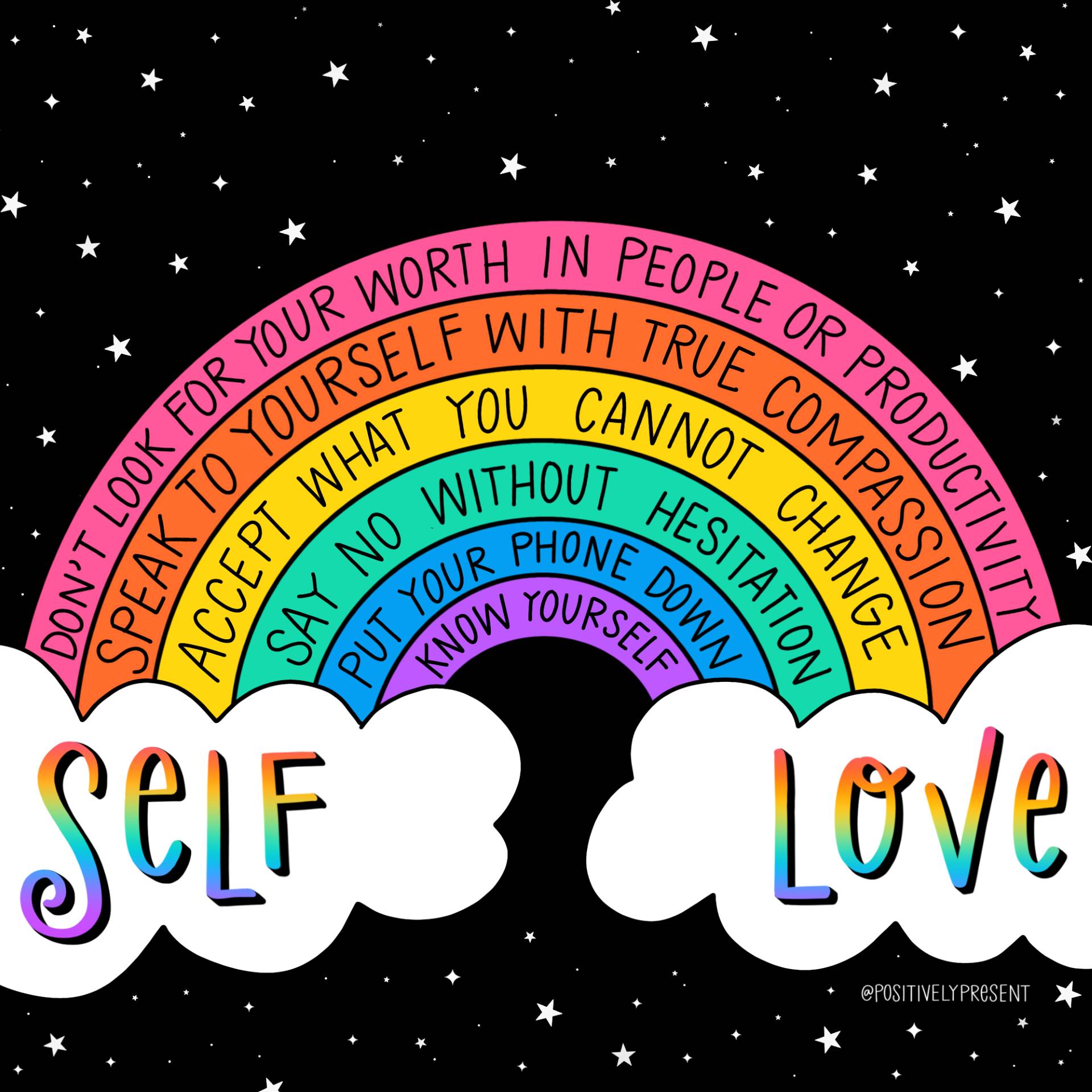Blog
Permanent link for Crushing Finals Week Like a Boss on April 18, 2024
I think we all know, it’s that time of the semester again: finals. I don’t mean to stress you out, but they’re right around the corner. In fact, after reading this article, hopefully you’ll feel slightly more equipped to handle the inevitable stress that comes with exam week with some helpful tips and tricks to get you through it.
Know When Your Exams & Culminating Experiences are Happening
Sometimes, your final exam meeting time is earlier than your actual class time, so it is very important to know when you should show up. You don’t want to be the person who shows up late to the exam, that would suck. So, know what time your final exams, presentations, and culminating experiences are happening. You can find out your exam time through the GVSU Registrar website, linked here. Just enter the first day your class meets and the time, and boom. That’s the time block GVSU has specifically chosen for your class to have the final exam or meeting. Make sure to clarify your final exam time with your professors, as well. Chances are, they might have made some time adjustments of their own, or, you might not have to meet in-person at all (fingers crossed).
Stay Organized
Although knowing when your final exams are is the first step towards relieving your anxiety about the week, there are other things you can do to relieve stress during this time. One way to manage feeling overwhelmed by your tasks is to stay organized. This can take many different forms. For example, you could:
- Write down your exam times. Or, if you’re like me (an education major), write down the due dates of your final projects. For each exam, you can also write down the topics that will be covered so you can keep track of what to study.
- Clean your room and study area. The less clutter around you, the more you can focus on your work and ace that test! This is an important aspect of environmental wellness, which involves the ability to sustain safe, clean, and healthy environments where we live, work and play. Taking a moment to tidy up your study space can help support your environmental wellness while also increasing focus!
- Make a to-do list. When I feel particularly overwhelmed by all of the projects and assignments I need to complete, it helps when I make a list and break down each task into smaller, more manageable chunks. Plus, it’s really satisfying to cross stuff off of a list, trust me.
- Try Time-Blocking. If you don’t even know where to start on studying or starting that big project, try blocking out your day. Time-blocking involves making a very specific schedule for yourself and sticking to it. This website provides a great example of what time-blocking can look like in addition to the benefits it can provide.
Focus on Your Wellbeing
I know it feels like there’s not time for a break, but trust me, there is. It’s important to take a break after 40-50 minutes of study time to maximize your productivity. Take time to relax, engage in physical activities like yoga or taking a walk, make sure to eat regularly, and breathe. Make sure to get enough rest and practice self-care. Listen to music, create a study group with your besties, or spend some time with pets (those fluffy friends do indeed reduce stress and anxiety).
If you don’t happen to own any pets, not to worry! You can find therapy dogs at the Mary Idema Pew Library on Tuesday, April 23rd from 6:00 - 8:00 PM. And when you do find yourself in need of a break, make sure to take advantage of the other “exam cram” events going on this week and next!
Maintain Positive Thoughts
Finally, I leave you the last, and perhaps most important piece of advice: utilize positive self-talk. It might sound silly, but if you think you’ll fail, then you will. But if you tell yourself that you’ve got this, then you will be more likely to succeed. Remember, your self-worth is in no way related to how well you can answer test questions or whether or not you succeed in a class.
I know it seems super overwhelming right now but everything will be okay, I promise. Life might be really stressful now, but you won’t be stressed forever. Soon, the semester will be over and you’ll be on to the next great adventure. You got this! Now go and crush the rest of the semester!
By: Sara, WIT Peer Educator
Categories:
General Wellness
Posted
on
Permanent link for Crushing Finals Week Like a Boss on April 18, 2024.
Permanent link for Let's Get Thrifty: April Shower Savings on April 5, 2024
As college students, many of us find ourselves trying our best to stick to a budget while also enjoying our college experience. There is a ton of financial advice out there about budgeting, lowering our living expenses, and how to find financial resources. However, we of course still want to have fun and wear the clothes we like and decorate our dorms or apartments the way we want. Here’s a secret: you can still have fun and express your style while shopping second-hand. Let's dive into how.
Shopping second-hand is one of the most effective ways to stay in or even under budget when it comes to clothing, furniture, and homewares. There are tons of thrift stores and second-hand shops that offer high-quality items at lower prices. Personally, I grew up lower-income and have been shopping second-hand my whole life. However, I acknowledge that there might be some stigma attached to it. If you're uncertain about diving into second-hand shopping, let's weigh the pros and cons.
Pros:
- Affordability: Items are often priced lower than their original retail price, making it budget-friendly.
- Unique Finds: You can discover one-of-a-kind pieces.
- Quality: Vintage items may be of higher quality than many modern counterparts, as they have stood the test of time.
- Sustainability: Extending the lifespan of clothing reduces waste and lessens the environmental impact of fast fashion.
- Supporting Small Businesses: Many vintage and secondhand shops are locally owned, providing the opportunity to support small businesses and local economies.
- Treasure Hunting: There's a thrill in the hunt for hidden gems and unique treasures.
Cons:
- Limited Sizing: Finding items in specific sizes can be challenging, especially for folks that wear non-standard sizing.
- Condition Concerns: Some items may show signs of wear or damage, requiring repairs or alterations.
- Time-Consuming: It may take time to sift through racks or online listings to find the perfect piece.
- Lack of Returns: Many second-hand stores have strict no-return policies, so you need to be sure about your purchases.
- Availability: Desired items may not always be in stock, especially for popular or sought-after pieces.
- Limited Selection: Depending on the location or store, the selection of items may be limited, leading to fewer choices.
When it comes to second-hand shopping, it's essential to understand the different types of stores and shopping methods available.
Thrift stores:
- Often donation-based, offering affordable prices ranging from $1 to $5 per item.
- Examples include
Consignment shops:
- Typically carry currently in-style and on-trend items, priced mid to high range, around $5 to $15 per item.
- Examples include
- Uptown Cheapskate- Grandville
- Style Encore - Grandville
- Plato's Closet- Grandville
- Urban Exchange- Grand Rapids
- Rock Paper Scissors Consignment Boutique- Grand Rapids
Vintage/antique shops:
- Offer items priced on the higher end, with pricing varying based on factors such as rarity and condition.
- Examples include:
- Le Vintage Rose Retro Shoppe- Grandville
- Decaydence Vintage- Grand Rapids (no website)
In addition to physical stores, there are other avenues for second-hand shopping, including online platforms like Facebook Marketplace and Buy Nothing Facebook Groups. You can also organize clothing swaps with friends or utilize resources like the CWGE’s Replenish Basic Needs Center for essential items.
So, how can you navigate second-hand shopping effectively? Here are some tips:
- Know What You Want: Have a clear idea of what you're looking for before you start shopping. This can help you stay focused and avoid impulse buys.
- Check for Quality: Inspect items carefully for signs of wear, damage, or stains. Pay attention to seams, buttons, zippers, and overall construction.
- Try Things On: Since sizes can vary widely in second-hand clothing, it's essential to try items on whenever possible to ensure a proper fit.
- Be Open-Minded: Keep an open mind and be willing to try new styles or brands. You might discover hidden gems that you wouldn't have considered otherwise.
- Research Brands: Familiarize yourself with brands known for their quality and durability.
- Shop Off-Peak Hours: Visit thrift stores during weekdays or early mornings when they're less crowded. This can give you more time and space to browse without feeling rushed.
- Set a Budget: Decide how much you're willing to spend before you start shopping. Setting a budget can help prevent overspending and ensure that you stick to your financial goals.
- Look for Sales and Discounts: Many thrift stores offer sales or
discounts on certain days of the week. Take advantage of these deals
to maximize your savings.
- Pro tip: ask if they have a student discount!
- Consider Alterations: Don't dismiss an item just because it doesn't fit perfectly. With a little bit of tailoring, you can often transform a thrifted find into a custom piece that's uniquely yours. Learning the basics of sewing can be really helpful- and often, you can find a sewing kit second-hand, too!
With these tips in mind, you can make the most out of your second-hand shopping experience, saving money while expressing your style and reducing your environmental footprint.
By: Rowan, WIT Peer Educator
Categories:
General Wellness
Posted
on
Permanent link for Let's Get Thrifty: April Shower Savings on April 5, 2024.
Permanent link for Embracing Social Wellness: A Guide to Spring Renewal on March 28, 2024
As the winter months fade away and spring begins to blossom, the world becomes more inviting and accessible. Spring offers an ideal opportunity to focus on nurturing our social wellness, fostering connections, and enriching our lives. We get more daylight and better weather to get outdoors without the concern of slipping on the ice. The amazing thing about spring is that it's a perfect time to start tending to our connections with others. In this post, we'll explore various ways to embrace social wellness and rejuvenate ourselves as we step into the vibrant spring season.
Step Outdoors for Social Connection
Spending time in nature not only benefits our physical health but also provides an excellent backdrop for social interaction. Whether it's a stroll with friends or an adventurous hike, the outdoors offers countless opportunities to bond while enjoying the beauty of the natural world. Research indicates that activities like walking not only improve physical health but also contribute to cognitive and mental well-being, indirectly enhancing social health as well. One study remarks that walking has “beneficial effects on several cardiovascular disease risk factors, including body composition, blood pressure, fasting glucose and maximal oxygen consumption.” Another study recognized walking as beneficial not only for physical health but also for cognitive and mental well-being, which can indirectly contribute to social health. With numerous trails and routes available, like those listed on the Outdoor Adventures site, individuals can customize their outdoor experiences to suit their preferences and schedules.
Additionally, riding public transportation presents another avenue for social engagement. Whether alone or with a friend, hopping on a bus not only familiarizes you with the public transit system but also allows for people-watching and the potential to meet new acquaintances. GVSU students can take advantage of free bus rides with a valid ID, making it easy to explore the city and expand their social circles. Even for those hesitant to strike up conversations, simply being present in a public space helps combat isolation, offering opportunities for relaxation with headphones and a good book. Check out the bus routes and schedule.
Engage in Campus Events and Clubs
GVSU provides a huge variety of events and clubs that cater to our different interests and passions. The GVSU event calendar serves as a tool for finding campus happenings. Likewise, student organizations offer avenues for connection and personal growth. LakerLink provides a directory of clubs where students can explore various interests and find communities that resonate with them.
If you’re still not sure about these options that's okay too! Remember that our social justice centers also host different clubs and events. Our social justice centers on campus host a myriad of clubs and events focused on promoting diversity, inclusion, and equity. These centers, such as the Center for Women and Gender Equity, the LGBT Resource Center, the Office of Multicultural Affairs, and the Veterans Resource Center, offer spaces for students to engage in meaningful dialogue, advocacy, and support. Here are links to their pages:
Link to the Center for Women and Gender Equity: https://www.gvsu.edu/cwge/events-calendar-14.htm
Link to the LGBT Resource Center: https://www.gvsu.edu/lgbtrc/programs-and-events-146.htm
Link to the Office of Multicultural Affairs: https://www.gvsu.edu/oma/
Link to the Veterans Resource Center: https://www.gvsu.edu/veterans/module-events-index.htm?siteModuleId=A3804B1C-0479-3EB8-4D4AB978C7C9C43C
A lot of communities also surround Grand Valley with a lot of engagement! Try looking for different events local to you.
Foster Social Bonds Through Hosting or Study Groups
Hosting gatherings with friends or peers provides an intimate setting for fostering social connections. Whether it's a casual game night, a DIY mocktail-making session, like the ideas on this site, or a collaborative study group, hosting offers a relaxed and affordable way to spend quality time with others. Even low-key gatherings, like sharing a potluck dinner or enjoying hot beverages, can strengthen bonds and create lasting memories.
For students lacking space or resources, campus facilities offer alternatives for hosting events and study sessions. Reserve group study rooms in the library or utilize open spaces on campus like in Kirkhof, where you can take a break by gaming.
Recap
As we embrace the spring, let us prioritize our social wellness and seize the opportunities available to us. Whether through outdoor adventures, campus engagements, or intimate gatherings, let us nurture our social connections and enrich our lives and communities. Spring symbolizes renewal and growth, making it the perfect time to March forward together toward vibrant social connections and holistic well-being.
By: Rowan, WIT Peer Educator
Citations
Fröberg, Andreas. “The COVID-19 Pandemic: The Importance of Physical Activity among Faculty Members.” Journal of American College Health, vol. 70, no. 6, Aug. 2022, pp. 1597–600. EBSCOhost, https://doi.org/10.1080/07448481.2020.1817037.
Karolemeas, Christos, et al. “A Systematic Literature Review on Health Benefits, Incentives, and Applications to Promote Walking in Urban Areas.” Future Transportation, vol. 3, no. 4, Dec. 2023, pp. 1385–400. EBSCOhost, https://doi.org/10.3390/futuretransp3040076.
Categories:
General Wellness
Press Pause
Posted
on
Permanent link for Embracing Social Wellness: A Guide to Spring Renewal on March 28, 2024.
Permanent link for Do you have a 3rd place?: What they are and how to find them on March 22, 2024
If you’re still shaking off the winter blues, loneliness could be the culprit, but certainly not uncommon. Loneliness is becoming an increasing issue in the U.S. with about 36% of Americans in total and 61% of young adults specifically saying they often feel seriously lonely. These statistics are even more alarming with the knowledge that people who are lonely have an increased risk of dying before their time. A lack of social connection could impact the risk of death more than smoking, obesity, or a sedentary lifestyle; not to mention the severely negative impact loneliness can have on mental health.
Have you heard about “third places”? Maybe you’re wondering why there is a resurgence of conversation around the idea lately, or maybe they are something new to you. Whether you have heard about “third places” or not, below you can find out what they are, what benefits they can bring (including warding off loneliness) and how to incorporate them into your own life to reap those benefits.
“Third place” 101
A third place or space is somewhere spent outside of one’s home (considered the “first place”) and one’s work (considered the “second place”). For students, our work or second place could also be school: the places we do homework and take classes. Outside of these often high-stress areas of our lives, a third place is where someone can enjoy being around others and gaining social connections without the responsibilities of work/school and home/chores looming over them.
Any fellow introverts out there? No need to worry! Research has shown there can be benefits from third places both when interacting with people within them or simply being around the people that are interacting with each other. There are many different styles to choose from when it comes to third places– a quiet library, a busy mall, a quaint café perfect for people-watching, a place of worship, a gym, where you get your haircut, a dog park…the list could go on!
Any requirements?
Although the idea of third places has gained popularity recently, the idea of third places are often attributed to Ray Oldenburg, a sociologist in the 1980s, who came up with eight ideal characteristics for a third place:
- They are neutral, meaning you never feel you have to be there for any reason, and there are minimal expectations from others.
- Based on an even playing field, as anyone is welcome in the space regardless of their status within their work or the community. There is nothing someone has to do or be in order to enter the space.
- Conversations are the star of the show, with humor and banter being encouraged by all.
- Easily accessible and accommodating those who stop by, including ideally being low-cost or free of charge.
- The regulars create the space and keep it alive by bringing in new people.
- They’re not highly acclaimed, but rather promote a comforting, informal environment.
- A goofy mood makes third places fun, witty and light-hearted.
- Home away from home in all aspects of the phrase including relaxed, warm, rejuvenating, securely established, and generates a feeling of ownership.
Above are some ideal characteristics, so some third places may only have a few of these but still fit the mold and provide benefits.
Does a third place really make that much difference on wellbeing?
I, and increasing research results, would argue that it does. One key characteristic of the Blue Zones, places around the world where there are especially high rates of longevity, is that these communities foster ideal third places. For example: in Nicoya, Costa Rica community member’s porches provide spaces where family and friends can engage on a daily basis. To read more about the Blue Zones, check out a previous blog post by peer educator Claire on what else the Power Nine have in common.
Where to find them
As you may have realized if you have gotten to this point, there can be some barriers to accessing a third place; whether that be transportation, finances or time restraints, a third place may seem far fetched in a busy student schedule. Nevertheless, there are many different ways you can find a third place that works for you, and there are many opportunities to engage in a third place in and around Grand Valley’s campuses. To get you started, here are some ideas:
- The Grand Ravines dog park
- Student organizations on Laker Link
- Campus dining locations
- Cafés near the Allendale campus or near the Laker Line stops
- Local libraries in Allendale or Grand Rapids
- The Rec Center spaces
- And many others!
If the options seem overwhelming, try thinking about some places you already enjoy spending your time. You may already be engaging in a third place without realizing it! If you’re feeling lonely or needing a place you can truly relax and recharge, fitting in some time in a third place may be worth a try. Best of luck on your third place journey!
By: Josie, WIT Peer Educator
Categories:
General Wellness
Posted
on
Permanent link for Do you have a 3rd place?: What they are and how to find them on March 22, 2024.
Permanent link for Growing Gratitude: A Spiritual Perspective for GV Students on March 14, 2024
In the midst of your academic goals, extracurricular activities, and social engagements, it's essential to remember the importance of spiritual wellness. One powerful way to enhance your spiritual well-being is through gratitude. Developing an attitude of thankfulness can lead to significant changes in your perspective on life, mental health, and emotional stability.
Walking into Professor Holli's class, as we settled in, she used to ask a simple question every day before starting class, "What are you grateful for today?" It was a simple question that confused me for the first time. At that moment, as my classmates shared their thoughts, I realized the power of gratitude. From then on, I started incorporating gratitude into my daily life, thanks to Professor Holli's inspiring practice.
Here are some tips on how to grow your gratitude to contribute to your spiritual wellness:
- Gratitude Journaling: Consider starting a gratitude journal where you can write down three things you are grateful for each day. This simple practice can help you focus on the positive aspects of your life, no matter how small, and shift your perspective towards appreciation.
Example: I am grateful for 3 square meals, a roof on top, and my family.
- Mindful Moments: Take a few moments each day to pause and reflect on the things you are thankful for. Whether it's a beautiful sunset, a supportive friend in your life, or a moment of clarity during a challenging class, being mindful of these blessings can deepen your sense of gratitude.
- Expressing Thanks: Don't hesitate to express your gratitude to those around you. Whether it's a quick thank-you note to a professor who inspired you, a text message to a friend who has been there for you, a message to the facilities department for their remarkable service, or a kind gesture towards a classmate in need, expressing thanks can strengthen your relationships and increase a sense of connection.
- Gratitude Walks: Take a small walk around the GVSU campus and pay attention to the beauty that surrounds you. Notice the changing seasons, the architecture of the buildings, and the energy of fellow students. Engaging in a gratitude walk can help you feel more connected to your environment and appreciate the present moment.
- Community Involvement: Get involved in community service or volunteer opportunities on campus or in the Grand Rapids area. Giving back to others can cultivate feelings of gratitude for what you have and provide a sense of purpose and fulfillment.
- Gratitude Meditation: Incorporate gratitude into your meditation practice by focusing on feelings of thankfulness and appreciation. Visualize all the blessings in your life, and let that sense of gratitude fill your heart and mind.
- Gratitude Challenges: Challenge yourself to find something new to be grateful for each day. This can help you develop the habit of seeking out positivity and abundance in every aspect of your life.
- Set Gratitude Alarms: Use daily reminders to pause and reflect on things you are thankful for, making gratitude a regular part of your day.
- Smile More: Cultivate gratitude and optimism by smiling more often. It can boost your mood and positively impact interactions with others.
- Create a Gratitude Jar: Write down things you are thankful for on paper and place them in a jar as a constant reminder of the good in your life.
By incorporating these practices into your daily routine, you can nurture your spiritual wellness and cultivate a deeper sense of connection with yourself, others, and the world around you. We should remember that gratitude is not just about saying "thank you" but about incorporating an attitude of appreciation and mindfulness in all aspects of your life.
“When eating fruit, remember the one who planted the tree." -Vietnamese Proverb
By: Aravind Gurusaran Korukonda, WIT Peer Educator
Image from Pinterest: https://www.pinterest.com/pin/650629477418026125/
Categories:
General Wellness
Press Pause
Rest
Posted
on
Permanent link for Growing Gratitude: A Spiritual Perspective for GV Students on March 14, 2024.
Permanent link for Are You Getting Enough Rest?: The Three Ingredients for a Good Night's Sleep on February 29, 2024
Have you ever found yourself dreaming about slipping back under the covers the moment you wake up in the morning? Do you ever watch your peacefully sleeping pets and wish you could effortlessly drift off like them?
I do, especially as someone who has struggled with insomnia for the past two years. Sometimes getting enough restful sleep can feel like a losing battle but there are tips and tricks that can make drastic changes.
So, with it being the week of Public Sleeping Day (Feb. 28th), I want to dive into the topic of sleep and our sleep habits. Why? Because most of us don't get adequate sleep, and at some point in life, everyone struggles with challenges related to sleep.
Sleep is the glue that holds our bodies and minds together. From preventing dementia and depression to mitigating high blood pressure and heart disease, there’s no lack of evidence that catching enough zzz’s is nature’s best medicine.
You know that feeling you get after a good night’s sleep? You face the day with a clear head, enthusiasm, and boundless energy. That’s the work of the brain’s glymphatic system (GS), it bathes our brain in a fluid that carries away toxins. The enzymes in this fluid are like little sanitation workers that only come out when you’re asleep. But, not just any kind of sleep, the kind that has you drooling on your pillow. This type of sleep is only reached when you are in REM sleep. There are four sleep stages in your sleep cycle: Non-rapid eye movement 1,2 and 3, and Rapid eye movement. The first two stages are light sleep, this is when you might twitch and are easily woken up. The second stage is the start of deep sleep while REM is deep sleep, this is when dreams occur.
The ingredients for a good night’s sleep fall into three categories: Environmental, Behavioral and Psychological. Each is important, and getting all three elements working together is the recipe for the perfect sleep.
Environmental Factors
A good sleep environment is dark (think: blackout curtains and shades and no glowing lights from devices etc.) It’s also quiet and cool (ideally below 65 degrees). So try turning down the heat or opening a window. Since it might be a little too chilly to open a window this time of year, consider a floor or ceiling fan, which has a bonus feature of white noise. I have found that white noise helps minimize racing thoughts at night. Sleep should be the time you relax and try not to stress about academics and other stressors.
If you sleep with pets, significant others or roommates it can be difficult to get your environment just right. It's important to shoo your pet out of the room or have a conversation with other sleepers near you on how to maximize your environment for the best sleep.
Here are some tips for before bed:
- Schedule a winding down time. Try grabbing a nice book, listening to a podcast/sleep playlist or meditation/yoga.
- Drink some tea. Teas with chamomile, lavender or passionflower is a perfect way to relax before bed. If you see the WIT cart on campus we offer free tea to grab!
- Open your senses with essential oils for aromatherapy.
- Earplugs, eye shades, black-out curtains, or a weighted blanket can help get you into the sleep zone. (WIT offers earplugs and eye shades for free when available)
- Find your ideal pillow.
- Try taking a hot shower or bath before bed.
- Use a sleep calculator to wake up between your sleep REM cycles.
Here are some tips when when you are in bed:
- Go commando. It's proven that sleeping naked can help your body maintain an ideal body temperature. You’ll want to skip this step if you live in a dorm, you wouldn't want to give your roommate a scare.
- Minimize distractions from electronics like using a sleep timer for example. As tempting as it is to scroll endlessly on tik tok or instagram, the blue light admitted from our devices causes your brain to not produce melatonin (the sleepy hormone).
- Focus on your breathing. Try this 4-7-8 technique.
- White noise is a game changer. My suggestion is this 12 hour long video on Youtube.
Behavioral Factors
Many sleep issues can be helped by changing pre-bedtime routines. We tend to get into bed with our minds still humming from the day, worrying about work, school, friends, everything and nothing at the same time. Some of us subconsciously run through our to-do list at the exact moment our head hits the pillow. How can we slow down our brain?
Here are some tips for use during the day that can affect your nightly routine:
- Try to get some sort of physical activity every day. A run or a walk can calm anxiety, and healthfully tire the body. Try not to exercise right before bed because that can have the opposite effect. Here is a link to our last WIT blog post about the importance of physical activity.
- Don’t eat a large meal during the three to four hours before bedtime. Remember that this can be different for everyone, try and find a schedule that works best for you.
- Nap strategically. A well-timed nap can help pay off your sleep debt, but nap too late in the day and it can impact your ability to fall asleep later. If you nap, shoot for under one hour and before 3 pm.
- Avoid drinking caffeinated beverages after noon.
- Avoid alcoholic beverages before bed.While alcohol sometimes makes us tired, it also has an energizing effect that kicks in as it metabolizes.
Psychological Factors
Episodes of sleeplessness are a common part of life, especially as a college student, yet when persistent insomnia or hypersomnia disrupts your well-being and health, it may signal deeper emotional and mental health concerns. It's important to address and manage factors such as stress, anxiety, burnout, recurring nightmares and depression directly. Seeking guidance from your doctor and seeking support as necessary is important when disrupted sleep goes deeper than environmental or behavioral factors.
If you are struggling GVSU has a wide variety of mental health resources and wellness coaching.
Here are some general tips and tricks you can do:
- Keep a journal or sticky notes near to jot down your late night thoughts. Decluttering your brain right before sleep is a lot better than wrestling with your to-do list during the night.
- Reserve your bed for sleep and intimacy. Try not to study in your bed to avoid your brain confusing your bed with other activities.
- Reading before bed is a great winding down activity, but avoid books with violence or too much excitement.
- Try to keep a consistent sleep schedule. This can help your body's internal clock know when to start getting tired.
Remember, it's okay to have struggled falling asleep, it's actually quite common, especially among college students. I hope these tips will help you catch some much needed sleep!
By: Lainey, WIT Peer Educator
Categories:
General Wellness
Rest
Sleep
Posted
on
Permanent link for Are You Getting Enough Rest?: The Three Ingredients for a Good Night's Sleep on February 29, 2024.
Permanent link for Physical Activity & Beyond! on February 22, 2024
Physical wellness is just part of the wellness wheel, but a super important one! With spring around the corner, it is a great time to get outside to get some physical activity!
What is physical wellness and physical activity?
Physical wellness is about making positive choices to maintain a healthy body! Healthy looks different for everybody, but one way to make a positive choice for your body can be through physical activity! The WHO states that physical activity is any physical movement that engages your muscles while exerting more energy than you would while resting.
Why is physical activity important?
According to the WHO, Physical activity can help mitigate and manage different health risks. Some of these include heart disease, stroke, diabetes, numerous cancers, and hypertension. Physical activity can also be good for enhancing mental health, maintaining a healthy body weight, bettering balance and sleep, and improving overall well-being and quality of life.
What is the recommended amount of physical activity to get as an adult?
The WHO recommends that adults between the ages of 18-64 should get between 150–300 minutes of moderate-intensity physical activity or between 75-150 minutes of vigorous-intensity physical activity a week or some combination of the two. This rounds out to be about at least 20 minutes of moderate-intensity physical activity a day or at least 10 minutes of vigorous-intensity physical activity a day each week. The WHO also suggests that this age group should do moderate-intensive muscle-strengthening activities of all major muscles at least 2 days a week and be conscious of how much time is spent being sedentary.
What are the different ways you can be physically active on campus and beyond?
Recreation and Wellness offers many opportunities for students to get physically active and involved, including the Climbing Center, UFit plan, Intramural Sports, Club Sports, Personal Training, Group Exercise classes, Swim Lessons, and more! Athletic and Recreation Facilities also offers Open Swim hours at the pool, Racquetball Courts by reservation, Open Recreation Center hours to get a workout in or play basketball on the basketball courts, Open Turf/Track hours at the Kelly Family Sports Center to throw around a frisbee, play spikeball, or run on the track! And most of these activities are free for students or are discounted!
Have you ever heard of Ottawa County’s Parks?! Grand Valley is surrounded by them! There is one within walking distance of Grand Valley! Take a friend, a dog, or yourself on a walk, run, or bike ride to get some physical activity at Grand Ravines North. Not too far from this entrance is Grand Raives South, which has a dog park and a suspension bridge! If you’re looking for other parks to get some physical activity, look no further than Grand River Park or the Grand River Open Space, which provides trails and serenity within a 10-minute drive from campus!
There are many ways of getting physical activity indoors on campus and in the great outdoors surrounding campus! Physical activity is a positive way of taking care of your physical wellness to maintain a healthy body! Remember to do what is healthy for you, as healthy looks different for everybody, and be safe while performing physical activity, too!
By: WIT Peer Educator, Ru
Categories:
Fitness
General Wellness
Outdoor Adventures
Press Pause
Rest
Posted
on
Permanent link for Physical Activity & Beyond! on February 22, 2024.
Permanent link for Reading for Wellness on February 15, 2024
As students, we are expected to read and read often. Many of us are drowning in textbook chapters, novels, articles, and wordy Blackboard discussion posts. While this reading is of course crucial to our educational endeavor, it can lead to huge reading burnout. Over winter break, I picked up a young adult romance novel and realized just how much I missed reading for enjoyment. It got me thinking about how I’ve learned to approach reading as a college student– I don’t unless I have to and when I do, I am skimming– part because I don’t have time to read, but part because I’m uninterested. A lot of people who came to college as bookworms have lost that part of themselves underneath all of the content– but it’s so important to win that part back. Others, maybe were never into reading– that’s okay too. But there’s so much more to reading once you get beyond the annoyance. Reading is like sex– especially if you’re reading erotica– everyone has yucks and yums and all are valid. There is a lot of reading material out there for everyone’s interest in well-being. We’ll dive more into this later.
Reading for relationship-building
There are a lot of published studies that highlight the importance of reading for mental wellness and intellectual wellness. Many of us have heard of reading to reduce stress and anxiety in addition to improving cognitive outcomes (check out this article that explores some of this!) However, one perk of reading that does not get emphasized enough is the benefit of reading for our social life; cracking open a book can improve social wellness! Reading perspectives that are similar and dissimilar to ours helps us improve our ability to communicate with others as well as build a foundation for solid values and understanding one another. One study concluded that reading “includes learning more about yourself and others; learning how to understand, empathize, and interact with other people; gaining insight into your and others’ relationships; and generally helping with personal problems” (https://journals.ala.org/index.php/rusq/article/view/4099/4667).
An additional option for exploration is book clubs! One study found that “A sense of belonging was achieved between students with a variety of differences and
disagreements. The sense of belonging extended to multiple contexts, deepening understanding and accountability within the academic and social aspects of learning” (Petrich 11).
Book clubs serve as an opportunity for social interaction while also creating a shared interest for discussion to break the ice. If you’re interested in joining a book club, there is a student organization Book Club. Find out more information on laker link. A lot of bookstores and coffee shops also host book clubs- keep your eyes peeled for fliers when you’re there!
Let’s Talk About Sex (In Literature)
So, speaking of erotica, let’s talk about sex. We live in a culture, and a geographical space, where sex is taboo. As a peer sex educator, I feel perfectly comfortable talking about sex and sex education- but I also acknowledge that there is stigma. Not everyone is having sex and not everyone wants to and that is so valid! For those wanting to explore sex and sexuality while remaining abstinent, one of the best places to go is literature. Of course, there are educational texts out there that include diagrams of penises and vulvas which are great to learn about anatomy, but there is so much more available than what we might’ve been taught in sex ed. There’s a huge variety of content that covers sex and sexuality such as romance novels, erotica, online fanfiction*, books that explore the psychology of sex and relationships, books about sexuality, and the iconic category that is “ah! Horny Vampires!” (looking at you Twilight and Dracula). Reading about sex and sexuality as an alternative to engaging in sex is great for protecting against STIs and pregnancy. When combined with sex, reading material like erotica can spice things up.
Check out some benefits of reading erotica: https://hellogiggles.com/erotica-benefits/
Self-proclaimed sexologist Lucy Rowett shares some books that led her to become a sexologist: https://lucyrowett.com/top-10-books-influenced-me-sexologist-purity-culture/
*Please be advised that fanfiction is a very broad genre and may be confusing to navigate. Often, there are fanfiction websites with special search engines that allow you to explore what you’re looking for. Search safely (and clear your browser history).
Financial Wellness
Finance literature may be an intimidating genre for many college students. However, there is a lot of information out there that does apply! While we may not care to learn about 401ks and savings bonds, doing some research on budgeting, how to use a credit card, and navigating student loans may be beneficial. One great resource if you’re looking for a shorter read is the Federal Student Aid webpage. The Federal Student Aid webpage contains a lot of information specific to students and offers different resource links for further reading and research!
Overview
There’s a lot of stuff out there to read! Instead of scrolling through Tiktok, consider looking for some reading materials- whether it be a full-length novel, an article, or a blog post (such as the WIT blog series). Read on!
By: Rowan, WIT Peer Educator
Categories:
General Wellness
Press Pause
Rest
Posted
on
Permanent link for Reading for Wellness on February 15, 2024.
Permanent link for The Blue Zones on February 8, 2024
Living a healthy and long life is something that many of us aspire to do. The average lifespan for someone living in the United States is about 77 years (according to the CDC). Quality versus quantity of life is also an important aspect to consider for this conversation. There is one location in the United States that stands out compared to the rest of the U.S.. Loma Linda, California is one of five locations throughout the world that is categorized as a Blue Zone. People in Loma Linda live up to ten years longer than the national average and people in Blue Zones typically live to 100 years. So let’s have an overview as to what makes the Blue Zones so unique.
The Power Nine
The Blue Zones were discovered and named by explorer and journalist Dan Buettner. Buettner identified the five Blue Zones- Ikaria, Greece; Loma Linda, California; Sardinia, Italy; Okinawa, Japan; and Nicoya, Costa Rica. Nine elements that these five locations have in common include:
- Movement; through everyday activity
- Purpose; having your “Why”
- Relaxation; taking time for yourself
- Eating to 80% fullness; not eating to uncomfortable fullness
- Rarely eating meat; prioritizing a plant-based diet with whole grains, beans, vegetables, nuts and seeds with the occasional fish or other meat
- Moderate drinking habits; especially within a social setting by having a glass of wine
- Community; belonging to a faith-based community or other communities that share interests or values
- Importance of family; being close to parents, grandparents, or lifelong partners
- Social belonging; your social circle or group of friends
In other words, the Blue Zones prioritized daily movement, a balanced diet and having a social circle to promote belonging and community. I can also see there is a general theme of low stress and overall enjoying life and the day-to-day activities a person does. The people in Blue Zones emphasize the importance of not getting stressed about the little things.
In the United States, there tends to be a culture that revolves around a ‘hustle and grind’ mentality, which is almost a polar opposite to the Blue Zones. Individuals in the Blue Zones also enjoy working. The work they do gives them a sense of community and purpose, not something that they need to do in order to be viewed as ‘productive’. The work they do also prioritizes their community and social circles to benefit the people around them. Finding a career that truly brings you joy and purpose can bring you one step closer to living like those in the Blue Zones.
These individuals eat and share a balance of eating what is healthy for one’s body but also fully enjoying the food. Eating fresh food that is in an abundance of plants and limited processed foods is a staple. Green leafy vegetables, beans, whole grains, and the occasional meat or fish is common. Meals are also centered around community and family as well, which emphasizes the importance of these connections. Through the majority of these Power Nine elements, the aspect of others and social wellness is something to make note of. Family, friends and community is what likely gives the Blue Zones its advantage towards longevity.
Additional resources:
https://www.cdc.gov/nchs/fastats/life-expectancy.htm
By: Claire, WIT Peer Educator
Categories:
General Wellness
Nutrition
Rest
Posted
on
Permanent link for The Blue Zones on February 8, 2024.
Permanent link for The Year of Self-Love on January 25, 2024
In case you didn’t know (just like I didn’t), January is Self-Love Month! What could be a better way to start off the new semester than that, huh? But, just because January’s almost over, that doesn’t mean you should stop practicing self-love during the rest of the year! For some of you, you might have self-love locked down. For others, it might be a bit harder. Either way, we’ve got some helpful tips and activities that’ll help you nurture and flourish the love you have for yourself.
What is Self-Love & What Does it Look Like?
Although it might seem obvious, let’s define what self-love really means. Self-love means having an appreciation of your worth; and having concern for, and giving attention to, your own happiness and well-being. Sometimes, that’s easier said than done, though. I know that I’m definitely guilty of putting the happiness of my friends and my partners before my own. It is a good thing to be selfless and put the needs of others first, but not when it’s at the expense of your own well-being. You deserve to be appreciated and happy. And no one else can truly appreciate you better than yourself.
So, we know what self-love is, but what does it look like? Well, self-love looks like taking care of yourself mentally, emotionally, physically, and socially. Simply put, practicing self-care can develop the love you have for yourself. Self-care encompasses the actions and practices that you take to support your overall well-being.
How To Develop Self-Love Through Self-Care
The first step in practicing self-care is to know yourself and your body. Start by taking a moment to recognize how you feel after engaging in specific activities like sleep, exercise, spending time with friends, a favorite hobby, or a night out partying. Which activities seem to drain you? And which feel like they rejuvenate you? Do some of them give you energy only for a certain amount of time before becoming draining? Knowing what makes you feel good (and what doesn’t) is the first step in knowing what you need in order to care for yourself.
For example, if you know you feel better after physical activity (and let’s be honest, most of us do), self-care is making room in your schedule to exercise, even if it means giving up something else like watching your favorite TV show. Sometimes, self-care isn’t fun. It means following through with what you need even if you don’t want to. Sometimes, self-care can be hard, too, such as having to set boundaries with friends and with loved ones. This can look like saying “no” when something is asked of you even if that means disappointing someone else, or standing up for yourself when you’re being treated unfairly. It can also look like ending a toxic relationship because it might be hard to see it, but you know that you deserve better.
All of this isn’t to say that self-care can’t be enjoyable or fun because it absolutely can be! Self-care can also look like taking a day off because you’ve been working really hard lately (maybe a little too hard) or reading a good book or going to see a movie. It can look like treating yourself to a special food or taking a relaxing bath, getting your hair done, playing a video game, or spending time with friends.
Ultimately, self-care is listening to your body and your mind, and then giving yourself whatever it is you need in order to feel your best and become the best version of yourself that you can be.
Classic Self-Care Tips
Some specific ideas for practicing self-care while at college include:
- Setting a routine (and sticking to it). As mentioned earlier with the exercise example, you may not want to do it, but you will benefit from it. So decide to do it and follow through; it’ll help you feel more productive and focused in the long run.
- Prioritizing your sleep. As a college student, there’s always something to do (trust me, I know). But making sure you get enough sleep each night (at least seven hours), will give you more energy to do even more things. Read more about How to Unleash Your Inner Sleeping Beauty!
- Eating as many balanced meals as possible. Again, another task that can be difficult for college students, but not impossible. Giving your body the nutrients it deserves will make you feel better physically and mentally. Here are some recipes from one of our other blogs!
I hope these ideas help you practice self-care and I wish you a very happy year of self-love!
By: Sara, WIT Peer Educator
Image created by Dani DiPirro on positivelypresent.com
Categories:
General Wellness
Nutrition
Press Pause
Rest
Sleep
Posted
on
Permanent link for The Year of Self-Love on January 25, 2024.

[1713467041].jpg)

